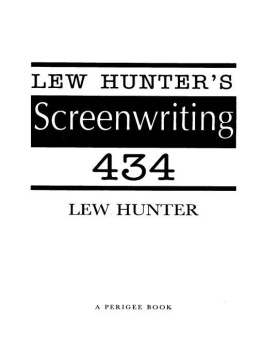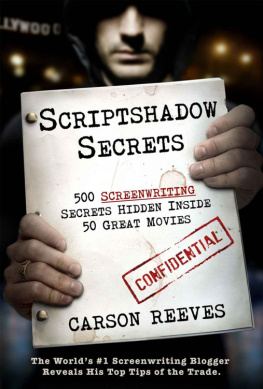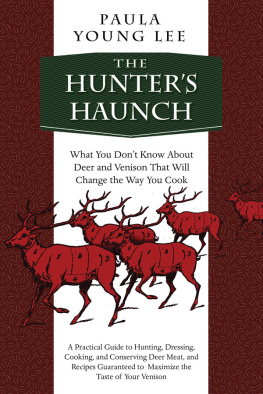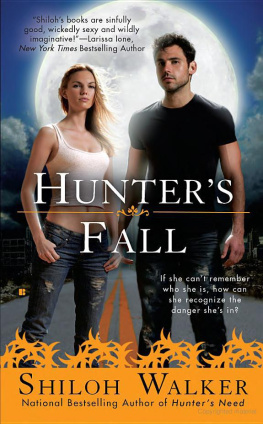Table of Contents
Garlands and potted plants to my beloved students,
Bill Froug, and my wife, Pamela.
All beloved but not in that order.
Perigee Books Published by The Berkley Publishing Group A division of Penguin Group (USA) Inc. 375 Hudson Street New York, New York 10014
eISBN : 978-1-101-00718-1
Visit our website at www.penguin.com
Copyright 1993 by Lew Hunter Productions
All rights reserved. This book, or parts thereof, may not be reproduced in any form without permission.
The Library of Congress has cataloged the Perigee trade paperback edition as folows: Hunter, Lew. Lew Hunters screenwriting 434 / Lew Hunter. p. cm.
Includes index.
eISBN : 978-1-101-00718-1
1. Motion picture authorship. I. Title. PN1996.H-32927 CIP 808.23dc20
Most Perigee Books are available at special quantity discounts for bulk purchases for sales promotions, premiums, fund-raising, or educational use. Special books, or book excerpts, can also be created to fit specific needs.
For details, write: Special Markets, The Berkley Publishing Group, 375 Hudson Street, New York, New York 10014.
http://us.penguingroup.com
ACKNOWLEDGMENTS
Super Editor, Steve Ross
The Worlds Greatest Agent, Richard Curtis
Rubin Carson
Richard Ray Walter
Andrea Rich
Gil Cates
Howard Suber
Robert Rosen
Bob Gray
Ruth Schwartz
John Young
Jorge Preloran
Jerzy Antczak
Alex Ayres
Stephanie Riseley
Edgar Bravo
Tony Caballero
Deanne Barkley, Harve Bennett, Dick Berman, John Ray Bernstein, Mel Bloom, Steven Bochco, Ray Bradbury, Richard Brenne, Stan Canter, Bruce Cowgill, James Dalessandro, Ken Dancyger, Lon Diamond, Barry Diller, Walt Disney, Dick Donner, Genevieve Ebsen, Michael Eisner, Jules Epstein, Maggie Field, Christine Foster, Len Goldberg, John Graves, Peter Guber, Bill Haber, Dean Hunter, Esther L. Hunter, Joe Hunter, Ray Lewis Hunter, Scott Hunter, Paul Jensen, Terry Keegan, Robert Lewis, Paul Lucey, John McMahon, Mike Medavoy, Shannon Morris, Steve Mills, Janet Neipris, Richard Newton, Dennis Olson, Jr., Michelle Olson, Michael Ovitz, Alex Petry, Frank Price, Stan Robertson, Stu Robinson, Ed Ropolo, Bill Sackheim, Jeff Sagansky, Bill Self, Michael Severid, Aaron Spelling, Eileen Rae Hunter-Sweeney, Brandon Tartikoff, Sam Thomas, Grant Tinker, Godbrother David Titcher, Card Walker, Lew Weitzman, Larry White, John Wilder, and the UCLA Writers Block.
A tremendous merci beaucoup to the above and the names in the index for their inspirational roles in my screen and book writing and professing careers.
Lewis Ray Hunter
Superior, Nebraska
FADE IN REDUX
What is different for screenwriting in the ten years that have rocketed by since the first publication of this book? Give up? OK, the answer is: NOTHING!
Yes, little things that relate to the formand one piece of craft I am going to tell you about in this new introductionbut in the total overall, I repeat, nothing, without caps so I dont get too pushy. Gertrude Stein wrote, A rose is a rose is a rose; I write, A story is a story is a story. We professors are charged by academia and our institutions, UCLA in my case, to break new ground, conquer new horizons, clichs that relate more to horticulture or astronomy than screenwriting. Every time someone tries something new, it seems as if they end up making a divertissement for the mirror, for the shelf in a lab or, if they are lucky, something direct-to-video/DVD.
Geoff Gilmore, co-director of that wonder of modern film wonders, The Sundance Film Festival, told me they screen more 1200 feature length films each year and pick about sixty for this seminal American event. The Utah hills are alive with the sound of film music and dialogue but the lab and video shelves groan with the work of those filmmakers who eschew Aristotles staple of storytelling structure: a beginning, middle, and end. Aristotle did not give us a formula in the pejorative sense of that word, but it is a formula that echoes the biological rhythm of The Audience. I cite Aristotle because I still consider his Poetics to be one of the two bibles for performance drama/comedy.
The second Holy Treatise is Lajos Egris The Art Of Dramatic Writing. You see, Aristotle did not get much into character as character was devalued in his day. Dramatists as often as not literally covered the actors faces with masks, hence the origins of the symbol for drama, the masks of comedy and tragedy. The Greek plays were much about gods and goddesses, not quasi-ordinary people such as you and I. And the amphitheaters in which these dramas were staged were not the intimate theaters of today or the big screen that reveals every pout and pore. It wasnt until the late 1800s when Strindberg and Ibsen, later to be joined by the likes of Eugene ONeil, offered up those slice of life or kitchen sink plays in which character was king.
Enter Lajos Egri, a somewhat failed playwright/screenwriter who distilled his independent teachings into a marvelous essay on character in The Art of Dramatic Writing. Of course, in my own teaching and writing, I go on and on about Ari and Egri. And, here in this Redux, I am reinforcing the point that it still doesnt get better than those two cats. If you are grounded in the Poetics and the character dictates of The Art Of Dramatic Writing, you have the bedrock information. Forget Walter, Seger, Field, McKee, Hague, Downs/Russin, Goldman, Hunter, et al. But, by all means read the self- and publicly acclaimed screenwriting gurus. Our volumes have become like recipe booksrecipes to help you build your own personal internal screenwriting structure. When you couple that knowledge with your individual creativity, voila, you become a screenwriter!
Although I still believe that nothing is new under the sun, in spite of Ecclesiastes there is a unique element that infuses every screenplay ... if you let it. You are whats new under the sun. As part of my research for a forthcoming book in which Academy Award-winning screenwriters bare their art, craft, and secrets, I asked Bill Goldman how he writes a screenplay. Bill erupted with: Oh God, the horror of it all is that we each do it so differently. No, no, I protested. Thats the glory of it all. I want it to show that writers dont have to be as good as Bill Goldman. They have to be as good as themselves. Their own uniqueness is the key here. I cant be as good as you. Ergo, can you be as good as me?
To prepare for this reissue of Lew Hunters Screenwriting 434, I reread the whole book with the idea of a somewhat gentle updatingmaybe some new thoughts or anecdotes, or examples. About halfway through, my memory flashed on Aristotle and Egri and how the syllabus I devised in 1979 for my original Screenplay 434 graduate class at UCLA, is still intact with Ari and Egri as its centerpiece. Getting students back to Aristotle and Egri was my real teaching job because superior storytelling has not changed since the time of the cave people to which I refer in Chapter One. Some of my rich and famous ex-students have come back for a 434 fix and I often catch them lip-syncing to my dialogue: Stay with the basics. Stay with the bedrock of yesteryears seminal storytellers. Stay with E Scott Fitzgeralds last line in The Great Gatsby: And so we beat on, boats against the current, borne back ceaselessly into the past.











